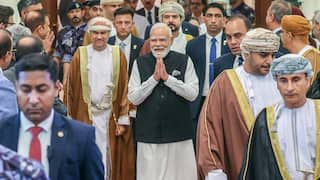Special Cargo Flight With Eight Cheetahs To Land In Gwalior. Take A Look At The Big Cats From Namibia
The customised jumbo jet reached the Namibian capital of Windhoek to transport the world’s fastest animal as part of one of the world's biggest inter-continental translocation projects.

The B747 Jumbo Jet from India that landed in Namibia on Thursday to ferry eight cheetahs will arive in Gwalior instead of Jaipur on Saturday, following which the big cats will be introduced into the Indian wildlife by Prime Minister Narendra Modi on his birthday on September 17. The eagerly awaited cheetahs from the African country will land in Gwalior before being taken to Madhya Pradesh's Kuno National Park.
“A special charter Cargo flight of Cheetahs coming from Namibia will now land in Gwalior, earlier it was supposed to land in Jaipur on September 17 then from a helicopter from Gwalior brought to KUNO National Park Sheopur,” said SP Yadav, Project Cheetah chief, according to the news agency ANI.
"Cheetahs being brought by chartered cargo flight of Boeing 747 flight. This aircraft has been chosen so flight does not have to stop for refuelling & can reach India directly," added Yadav.
ALSO READ: Delhi Excise Policy Scam ED To Question AAP Leader Satyendar Jain In Tihar Jail Today (abplive.com)
The customised jumbo jet reached the Namibian capital of Windhoek to transport the world’s fastest animal as part of one of the world's biggest inter-continental translocation projects.
"Satellite radio collars have been put on each Cheetah for their geolocation updates which will be monitored. Each Cheetah will also be given a dedicated monitoring team that will monitor it, patrol it, update us with any of its movements," informed Yadav, according to ANI.
Cheetahs To Be Released By PM
PM Modi will release three cheetahs into the parks quarantine enclosures, said Yadav.
#WATCH | First look of Cheetahs that will be brought from Namibia to India on 17th September at KUNO National Park, in Madhya Pradesh pic.twitter.com/HOjexYWtE6
— ANI (@ANI) September 16, 2022
The first-of-its-kind transcontinental mission will ferry five female and three male cheetahs to India in a special aircraft from Namibia’s capital Windhoek, according to the news agency PTI.The big cats will be traveling overnight to land in Gwalior from where they will be flown in a special helicopter to the Kuno National Park in Madhya Pradesh.
The five female cheetahs are aged between two years and five years and the male cheetahs are aged between 4.5 years and 5.5 years, as per the cheetah Conservation Fund (CCF), an international not-for-profit organisation headquartered in Namibia.
The male cheetahs include two brothers who have been living on the CCF’s 58,000-hectare private reserve near Otjiwarongo, since July 2021. It is when the CCF staff initially noticed their tracks around the Centre. Male cubs from the same litter stay together for life and form coalitions to hunt.
One male cheetah among them was born at the Erindi Private Game Reserve, protected wildlife and ecological reserve in central Namibia, in March 2018, according to the fund that is dedicated to saving the cheetah in the wild. His mother was also born there.
Another female cheetah was discovered with her brother at a waterhole near the city of Gobabis in southeastern Namibia while another female cheetah was captured in a trap cage on the CCF’s neighbouring farm in July 2022. It was owned by a prominent Namibian businessman.
Another female cheetah was born at Erindi Private Game Reserve in April 2020. Her mother was in the CCF’s cheetah rehabilitation programme and had been successfully returned to the wild a little more than two years ago.
A skinny and malnourished fourth female cheetah was spotted on a farm near Gobabis, Namibia, in late 2017 by farm workers who nursed her back to health, reported news agency PTI. The CCF staff picked up another female from a farm located in the north-western part of Namibia close to the village of Kamanjab in February 2019.
The large carnivore will be introduced into the country after the cheetah was declared extinct in 1952. The big cats were completely wiped out due to their use for coursing, sport hunting, over-hunting and habitat loss.
Starting in the 1970s, the efforts of the Indian government to re-establish the species in its historical ranges in the country led to the signing of a pact with Namibia, which is donating the first eight individuals to launch the cheetah reintroduction programme, on July 20 this year.






































